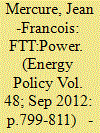| Srl | Item |
| 1 |
ID:
052293


|
|
|
|
|
| Publication |
Oct 2004.
|
| Summary/Abstract |
This paper presents the results of using a stylized optimization model of the global electricity supply system to analyze the optimal research and development (R&D) support for an energy technology. The model takes into account the dynamics of technological progress as described by a so-called two-factor learning curve (2FLC). The two factors are cumulative experience ("learning by doing") and accumulated knowledge ("learning by searching"); the formulation is a straightforward expansion of conventional one-factor learning curves, in which only cumulative experience is included as a factor, which aggregates the effects of accumulated knowledge and cumulative experience, among others. The responsiveness of technological progress to the two factors is quantified using learning parameters, which are estimated using empirical data. Sensitivities of the model results to the parameters are also tested. The model results also address the effect of competition between technologies and of CO2 constraints. The results are mainly methodological; one of the most interesting is that, at least up to a point, competition between technologies-in terms of both market share and R&D support-need not lead to "lock-in" or "crowding-out".
|
|
|
|
|
|
|
|
|
|
|
|
|
|
|
|
| 2 |
ID:
115180


|
|
|
|
|
| Publication |
2012.
|
| Summary/Abstract |
This work introduces a model of Future Technology Transformations for the power sector (FTT:Power), a representation of global power systems based on market competition, induced technological change (ITC) and natural resource use and depletion. It is the first component of a family of sectoral bottom-up models of technology, designed for integration into the global macroeconometric model E3MG. ITC occurs as a result of technological learning produced by cumulative investment and leads to highly nonlinear, irreversible and path dependent technological transitions. The model uses a dynamic coupled set of logistic differential equations. As opposed to traditional bottom-up energy models based on systems optimisation, such differential equations offer an appropriate treatment of the times and structure of change involved in sectoral technology transformations, as well as a much reduced computational load. Resource use and depletion are represented by local cost-supply curves, which give rise to different regional energy landscapes. The model is explored for a single global region using two simple scenarios, a baseline and a mitigation case where the price of carbon is gradually increased. While a constant price of carbon leads to a stagnant system, mitigation produces successive technology transitions leading towards the gradual decarbonisation of the global power sector.
|
|
|
|
|
|
|
|
|
|
|
|
|
|
|
|